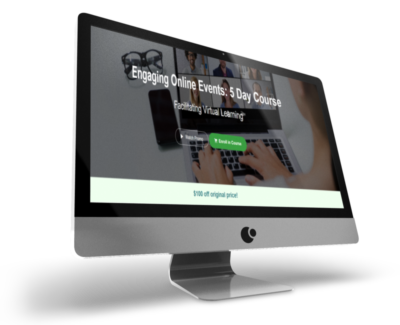Don’t forget this module in your next online course and eLearning intros
When creating an online or eLearning course, it’s crucial to include a module or introduction lesson that outlines expectations, navigation, and available support to help learners get started. eLearning intros are a foundational step that ensures a smooth and engaging learning experience from the outset. Feel free to copy and customize the information in this blog to suit your specific context and details; just be sure to reference me. Drawing from my experience and knowledge, I collaborated on this content and consulted ChatGPT to ensure nothing was overlooked. However, many elements are from my experience, considering the learner’s experience and reducing risk and liability.
Here is an example for your online course introduction or navigation module:
Getting Started with Your Online Course
Welcome
Welcome to the [Course Name] course, brought to you by [Academy Name]! We’re excited to have you join us. This course will prepare you for success in [Specific Field/Area]. This introductory module will help you start by covering essential learning strategies and technical requirements. Please let me know if you think something is missing from this eLearning intro; a course evaluation can be found at the end of the course. Some of these points may feel too extensive for your context; they are worth considering and discussing.
Section 1: Technical Requirements
1.1 System Requirements
Ensuring your computer meets the system requirements will help you avoid technical difficulties and ensure a smooth learning experience. To learn more about the course hosting platform, [add the link to the platform help page].
What you need: If you are in a public space, have a headset or earbuds connected to your device so that you can turn on the sound. This will help you learn the best.
Make sure your desktop computer, laptop, tablet, smartphone, or smart device has the following recommended system requirements:
- The most recent version of one of the web browsers (e.g., Chrome, Firefox, Safari, Edge)
- Javascript enabled
- PDF plugin
- Graphic and audio output capability
- Broadband internet connection with a minimum speed of 5Mbps (recommended)
- TLS 1.2 is supported by your web browser
- Additional software/plugins:
1.2 Internet Connectivity
A reliable internet connection is essential for viewing the video demonstrations and reviewing learning content and materials.
Tips for optimizing Internet performance:
- Use a wired connection if possible.
- Avoid peak internet usage hours.
- Ensure your router is functioning correctly.
1.3 Navigation of the Learning Platform
Familiarizing yourself with the learning platform will help you navigate the course smoothly and maximize the available resources.
Guided tour of the learning platform:
- Each module includes multiple lessons.
- Lessons may include video demonstrations, images (with ALT text), text-to-read, and interactive activities.
- Videos will have instructions: Select the arrow (or play button icon) to play, listen to, and/or watch a video.
- Some videos play automatically, depending on your browser.
- Click the CC on the lower right of the video to activate Closed Captions.
- The Gear icon allows you to speed up or change the video quality.
- Interactive activities may include “Click on an image to flip it” or “Click the + sign to open the drop-down.”
- Scroll down in each lesson to view all the content.
- Each module includes a quiz.
- The entire course program includes an exam or test at the end.
- A certificate is provided upon completing all program requirements.
Other Tips:
- Clicking a link may open a new window; you remain logged into the course in another window.
- When finished with a learning segment, you can pick up where you left off when you return.
1.4 Technical Requirements, Accessibility, Support, and Disclaimer
This course has been designed to support a variety of learners and contexts best. Please let us know if you need something that is not currently available.
- Each image includes ALT text, and videos include Closed Captions.
- Disclaimer: Warning – some video clips may have pulsing lights, loud sounds, etc.
- For technical issues, [link the platform Troubleshooting options].
- The hosting platform may schedule system maintenance [link this page for learners].
- Contact our support team for assistance.
Contact details for technical support:
- Email: [support email]
- Phone: [support phone number]
- Response time: [how many business days]
Section 2: Learning Success
2.1 Your Learning Approach
As an adult learner, the effort you put into the course will reflect your learning outcomes. Engage with every video, demonstration, and activity. Discuss what you learn with others, and apply the knowledge in your work if applicable.
Some modules have downloadable resources to support your learning. Some are helpful to print and use while going through the lessons. Each person learns differently. Take the time to take the steps that help you remember content. That may mean reading everything out loud, talking about what you are learning with someone else, writing out notes while you watch and listen to the videos, or using other strategies. You own your learning journey.
2.2 Time Management
The advantage of a self-directed online program is flexibility. However, consistency is key. To maintain momentum, avoid long breaks between modules.
Content Overview:
- Interactive aspects, over [number of videos] video demonstrations or tutorials, lessons, and more.
2.3 Study Techniques
Experiment with different study techniques to discover what works best for you.
Effective study techniques:
- Pomodoro Technique: Study for 25 minutes, then take a 5-minute break.
- Active Recall: Regularly test yourself on the material.
2.4 Setting Goals
Set clear, achievable goals to stay motivated.
SMART Goals:
- Specific
- Measurable
- Achievable
- Relevant
- Time-bound
Examples:
- Short-term: “Complete the first module by the end of this week.”
- Long-term: “Achieve a 90% average in all assignments by the end of the course.”
Section 3: Course Expectations
- If there will be an exam or quiz, learning evaluations, and passing requirements
- If the courses need to be completed in order
- If videos must be watched completely before moving forward
- If a discussion board or any interactions with other learners or the instructor will occur
- If assignments are to be submitted and related details
- How long you have access to the course
- If you are receiving a certificate when you complete the course, and how long that certificate is valid
- Any other details that make your eLearning or online course unique, and what would help support your learner
Section 4: Code of Conduct and Disclaimers
Respectful Behavior
- All students are expected to engage respectfully with instructors and fellow students. This includes refraining from bullying, harassment, or discriminatory behaviour.
- Respectful communication is mandatory in all interactions, whether online or during onsite sessions.
Code of Conduct
- Adherence to the Code of Conduct is required at all times. Any behaviour that disrupts the learning environment or negatively impacts other learners will result in disciplinary action, including possible removal from the course.
Diversity and Inclusivity
- The Academy values and promotes diversity and inclusivity. Students are expected to respect and appreciate differences in culture, gender, age, religion, and abilities.
- Discriminatory remarks or actions are strictly prohibited and will not be tolerated.
Accessibility
- The Academy strives to make learning accessible to all students. If you have any specific accessibility needs, please contact us so we can accommodate you.
Confidentiality
- Students are expected to maintain the confidentiality of personal information shared during the course. This includes information shared during interactive sessions, group activities, and discussions.
- Breaching confidentiality may result in disciplinary action.
Academic Integrity
- Academic honesty is crucial. Plagiarism, cheating, and any form of dishonesty will not be tolerated.
- Students must submit original work and provide appropriate citations when referencing external sources.
Technical Requirements
- Students are responsible for ensuring their devices meet the technical requirements to access course materials and participate in activities.
- The Academy is not responsible for technical issues related to your devices but will provide support to help you navigate the course platform.
Health and Safety
- For onsite learning experiences, students must adhere to all health and safety protocols established by the Academy.
- Failure to comply with these protocols may result in removal from the onsite experience and the course.
Liability Disclaimer
- The Academy, owner, and instructors are not liable for any injuries, losses, or damages that may occur during the course, whether online or onsite or the application of the learning materials.
- Participation in the course is at your own risk, and you accept full responsibility for any outcomes resulting from your participation.
- Please read all disclaimers and information that will help support your learning success.
Conclusion
Summary:
- Technical requirements and support
- Effective learning strategies
- Time management tips
- Study techniques
- Setting goals
- Course Expectations
- Code of Conduct and Disclaimers
You are ready to begin! We are excited to have you on this learning journey. Remember, preparation is the first step towards success. Let’s get started!
Additional Resources and Information
Links and References:
- Technical information and FAQs: [link to the platform]
- Glossary of technical terms: [resource section link]
- Job aids and resources: [end of the program link] Or throughout, some downloadable
- References and source materials: [end of the program link]
Notice of Ownership and Copyright
This program and all included information are the property and copyright of [Organization Name]. No part of this program may be reproduced without permission. Downloads and job aids are for the individual use of the purchaser. Access to learning materials is restricted to those who have purchased the program.
Group Rates: If your organization is interested in purchasing this program at a group rate, please contact [Group Rate Contact Information].
To conclude, you may copy and paste, editing the information within this blog for your context; please reference this article. Consider what helps set up your learners for success, and what removes barriers for them. An introduction module can help people get ready to learn.
Related Podcast
 Hot Bonus Tip
Hot Bonus Tip
- When people feel supported when starting to learn online or navigating their course, they are more likely to complete it and be happy about the experience!
- Giving your participants more control over their learning experience, especially as adults, shows respect and creates a safe learning environment for everyone. When people feel safe and respected, they are more open to the learning experience and participating.
Stay tuned
Future blog posts will include tips on creating Videos for your online course, tips on Using AI to develop training, MS Teams Tips and tricks, Hybrid contexts, eLearning course development, facilitation onsite or online considerations, and more. Email me if you have an idea for a future blog post or video tutorial.
If you missed it: New Zoom Workplace; Updated Zoom Settings; Facilitator Carry-on Bag Must Bring List; Are you losing learners? The Neurodiverse Workplace (Book Recap) Working with Clients or Vendors/Consultants
‘Virtual Facilitator Course’
Turn your audience into participants!
Plus take our Learning Types Quiz
Author
Patricia Regier, MEd is the Online Expert who’s built a career on the belief that training and online learning doesn’t have to be boring. As Owner of Regier Educational Services and with a Master of Adult Education, Patricia is known for making her audience feel empowered, engaged, courageous and confident. Her debut book and keynote, The Online Shift teaches newcomers to the online space and seasoned professionals alike how to optimize their online presence and maximize engagement. She’s tried, tested and refined using the latest behavioral science, research and psychology to make sure your next online experience is a hit!
To book Patricia as a speaker, please email patricia@regiereducation.com







